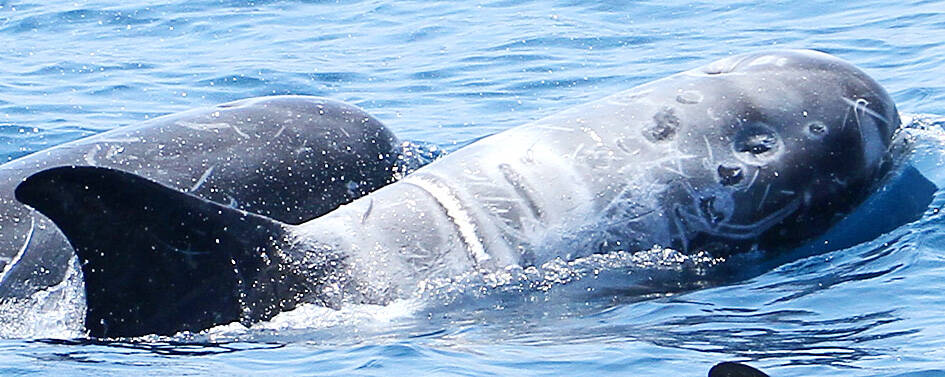Fishing, shipping and marine waste are the three main threats to the natural habitat of Risso’s dolphins, an illustrated book on cetacean scars published by the Kuroshio Ocean Education Foundation said.
Risso’s dolphins are the second-most frequently spotted cetacean species along the coast of Hualien County, the foundation said yesterday, citing data collected from 1998 to 2021.
Studies conducted in other countries showed that cetacean body scars are sustained naturally or through human activities, the foundation said.

Photo courtesy of the Kuroshio Ocean Education Foundation via CNA
Risso’s dolphins are born with a grayish-black body and would sustain light-colored scars while fighting with peers and hunting for food, it said.
“For our study, we chose to study Risso’s dolphins using the research method of photo identification. By identifying the cetacean body scars, we can understand threats facing Risso’s dolphins in their natural habitat,” foundation executive director Lin Dong-liang (林東良) said in a statement.
Foundation researcher Hu Chieh-hsi (胡潔曦) said that they have tracked 50 Risso’s dolphins and found that 19 of them had sustained scars that were suspected to be caused by human activities, likely by the fishing and shipping industries.
Researchers further identified 11 types of cetacean scars.
The most common types were cuts at the front of the dorsal fin and linear strangle marks on the body, he said.
“We suspect that injuries occurred after the dolphins were entangled in fishing nets or struck by ship propellers,” Hu said.
The foundation also tried to identify the causes of the scars by interviewing fishers, who said that Risso’s dolphins were often cut by or entangled in big-mesh drift gillnets.
The device is mostly used by fishers to catch marlins and ocean sunfish, it said, adding that fishers have reported seeing spinner dolphins, false killer whales, Freud’s dolphins and small sperm whales captured in gillnets by accident.
Most cetaceans captured in gillnets die, as they cannot surface to breathe, the foundation said.
Researchers also found that some of the cetacean scars occurred because fishers engaged in longline fishing use squids as bait.
“Risso’s dolphins might take the bait and sustain scars at the corners of their mouths as they struggle to free themselves from the hook. Their dorsal fins or tails might be damaged after being entangled by the fishing line,” the foundation said.
“A severe injury on the dorsal fin or the tail could affect their ability to swim, making it difficult to hunt for food,” it said.
“Banning certain fishing methods and fishing activities is not the only way out,” Lin said.
“Studies in other countries have suggested using flashlights, buzzers and other equipment to avoid accidental injuries to cetaceans, or limiting the speed of ships in cetacean hotspots to mitigate risks,” he said.
Lin said that the research showed that fishing off the east coast has potential adverse effects on cetaceans, adding that long-term monitoring of the marine ecology is necessary.
The current cetacean ecological survey can be used as a basis for the designation of cetacean protection areas and for the government to formulate regulations, the foundation said.
The book can be viewed on the foundation’s official Web site at www.kuroshio.org.tw/newsite.

Beijing could eventually see a full amphibious invasion of Taiwan as the only "prudent" way to bring about unification, the US Department of Defense said in a newly released annual report to Congress. The Pentagon's "Annual Report to Congress: Military and Security Developments Involving the People's Republic of China 2025," was in many ways similar to last year’s report but reorganized the analysis of the options China has to take over Taiwan. Generally, according to the report, Chinese leaders view the People's Liberation Army's (PLA) capabilities for a Taiwan campaign as improving, but they remain uncertain about its readiness to successfully seize

Taiwan is getting a day off on Christmas for the first time in 25 years. The change comes after opposition parties passed a law earlier this year to add or restore five public holidays, including Constitution Day, which falls on today, Dec. 25. The day marks the 1947 adoption of the constitution of the Republic of China, as the government in Taipei is formally known. Back then the Chinese Nationalist Party (KMT) governed China from Nanjing. When the KMT, now an opposition party in Taiwan, passed the legislation on holidays, it said that they would help “commemorate the history of national development.” That

HORROR STORIES: One victim recounted not realizing they had been stabbed and seeing people bleeding, while another recalled breaking down in tears after fleeing A man on Friday died after he tried to fight the knife-wielding suspect who went on a stabbing spree near two of Taipei’s busiest metro stations, Taipei Mayor Chiang Wan-an (蔣萬安) said. The 57-year-old man, identified by his family name, Yu (余), encountered the suspect at Exit M7 of Taipei Main Station and immediately tried to stop him, but was fatally wounded and later died, Chiang said, calling the incident “heartbreaking.” Yu’s family would receive at least NT$5 million (US$158,584) in compensation through the Taipei Rapid Transit Corp’s (TRTC) insurance coverage, he said after convening an emergency security response meeting yesterday morning. National

Taiwan has overtaken South Korea this year in per capita income for the first time in 23 years, IMF data showed. Per capita income is a nation’s GDP divided by the total population, used to compare average wealth levels across countries. Taiwan also beat Japan this year on per capita income, after surpassing it for the first time last year, US magazine Newsweek reported yesterday. Across Asia, Taiwan ranked fourth for per capita income at US$37,827 this year due to sustained economic growth, the report said. In the top three spots were Singapore, Macau and Hong Kong, it said. South